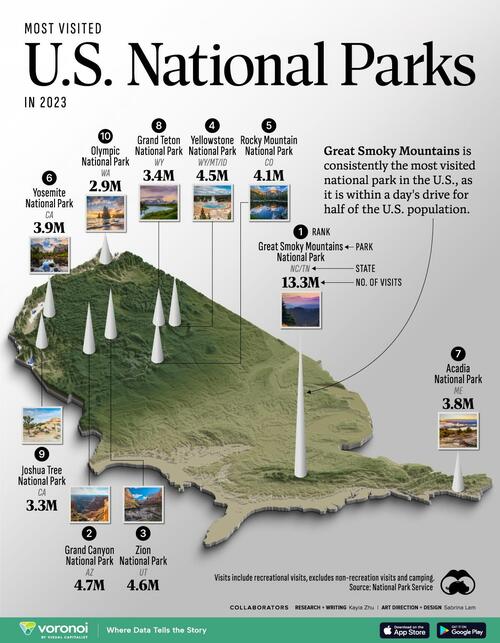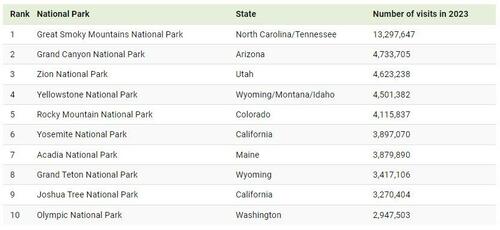
Visitor numbers have been steadily increasing across national parks in the U.S., as more people are opting to trade city skylines for mountain peaks and lush forests.
In 2023, U.S national parks welcomed 93.4 million visitors and saw a 4% year-over-year increase from 2022.
According to National Park Service data, national parks made up 28% of all visits out of all nationally-regulated park types, which includes national monuments, memorials, historic sites, and more.
This map, via Visual Capitalist's Kayla Zhu, visualizes the top 10 busiest national parks in the United States by number of visits in 2023. Visits includes recreational visits, and excludes non-recreational visits and camping.
The data comes from the National Park Service and is updated as of February 2024.
Western U.S. Home To Busiest National Parks
Great Smoky Mountains, which straddles the border between North Carolina and Tennessee, saw almost three times the amount of visits compared to second-place Grand Canyon. It is consistently the most visited national park in the country.
This sprawling park is easily accessible for many Americans, located just a day’s drive away for more than half of the U.S. population.
In terms of location, Great Smoky Mountains and Acadia are outliers among the top 10. The Western United States is home to a majority of the busiest parks, like Grand Canyon in Arizona, Zion in Utah, Yellowstone in Wyoming, Montana, and Idaho, and Yosemite in California.
The western half of the country is known for its extensive protected areas, natural landmarks, and outdoor recreation opportunities. California is home to the highest number of national parks, at nine, while other western states like Utah (five parks) and Colorado (four parks) rank among the top five.
Acadia, the only park located in the Northeastern U.S., is significantly smaller compared to other top national parks, spanning about 49,000 acres, compared to the next smallest park, Zion, which has an area of 147,242 acres.
Visitor numbers have been steadily increasing across national parks in the U.S., as more people are opting to trade city skylines for mountain peaks and lush forests.
In 2023, U.S national parks welcomed 93.4 million visitors and saw a 4% year-over-year increase from 2022.
According to National Park Service data, national parks made up 28% of all visits out of all nationally-regulated park types, which includes national monuments, memorials, historic sites, and more.
This map, via Visual Capitalist’s Kayla Zhu, visualizes the top 10 busiest national parks in the United States by number of visits in 2023. Visits includes recreational visits, and excludes non-recreational visits and camping.
The data comes from the National Park Service and is updated as of February 2024.
Western U.S. Home To Busiest National Parks
Great Smoky Mountains, which straddles the border between North Carolina and Tennessee, saw almost three times the amount of visits compared to second-place Grand Canyon. It is consistently the most visited national park in the country.
This sprawling park is easily accessible for many Americans, located just a day’s drive away for more than half of the U.S. population.
In terms of location, Great Smoky Mountains and Acadia are outliers among the top 10. The Western United States is home to a majority of the busiest parks, like Grand Canyon in Arizona, Zion in Utah, Yellowstone in Wyoming, Montana, and Idaho, and Yosemite in California.
The western half of the country is known for its extensive protected areas, natural landmarks, and outdoor recreation opportunities. California is home to the highest number of national parks, at nine, while other western states like Utah (five parks) and Colorado (four parks) rank among the top five.
Acadia, the only park located in the Northeastern U.S., is significantly smaller compared to other top national parks, spanning about 49,000 acres, compared to the next smallest park, Zion, which has an area of 147,242 acres.
Loading…






